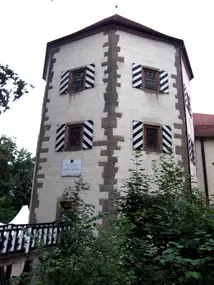Theater Trip to the Burgfestspiele Jagsthausen
On Sunday, 31st July 2011, a group of ten students, together with their lecturer Dr. Nicole K. Konopka, visited the valley of the river Jagst, near Heilbronn in Baden-Württemberg.
The trip concluded a seminar on the figure of the outsider in German and US-American literature and culture. Throughout the semester, the course tried to answer the questions what exactly an outsider is, and why the figure of the social bandit plays such a prominent role in the cultural narratives of so many societies. Readings included the Middle English ballad The Lyttell Geste of Robyn Hode (ca.1400), Friedrich von Schiller's play Wilhelm Tell (1804) and Ron Hansen's novel The Assassination of Jesse James by the Coward Robert Ford (1983); the course also discussed religious outsiders such as the Amish, self-proclaimed noble robbers such as Julian Assange, the democracy of the pirate ship, the stigmata of the mad(wo)man, and how 'outside spaces' such as the Wild West and the ocean were eventually perpetrated and conquered.
The theater performance focused on yet another fascinating outsider figure. Born in 1562, Gottfried von Berlichingen zu Hornberg served as a Frankonian Imperial Knight of the Holy Roman Empire and gained recognition during Swabian Peasant's War in 1524. His fight for freedom and justice was immortalized by Johann Wolfgang von Goethe in his play Götz von Berlichingen, first performed in Berlin in 1773. Since the 1950s, the drama has been performed annually in the ancestral castle of the Berlichingens, the Götzenburg in Jagsthausen. In recent years, the performance has been updated for a more contemporary audience and thus was able to attract thousands of viewers per season.
Arriving in Jagsthausen, the group first experienced local hospitality in the Red Castle, enjoying lunch in a former, somewhat otherworldly horse barn. The castle Jagsthausen itself was lovingly restored to its former glory, now including a hotel and an inner courtyard that serves as playhouse with an open air stage. The stage was sparsely furnished with props, but cleverly involved the castle walls as part of the scenery. And while the darkening evening sky emphasized the fate of the play's protagonist, the stark contrast between Goethe's text and the rather modern and minimal stage production added a level of displacement to the drama: as the knight with the – literally – iron fist is feeling more and more at odds with the world around him, the audience feels a growing tension between the historic language and the postmodern setting. This transfer of the outsider experience from the actors on stage to the audience was perhaps the best possible conclusion for a class on cultural and literary outsiders, making the range and dynamics of the outsider concept tangible for everyone.
by Nicole K. Konopka



